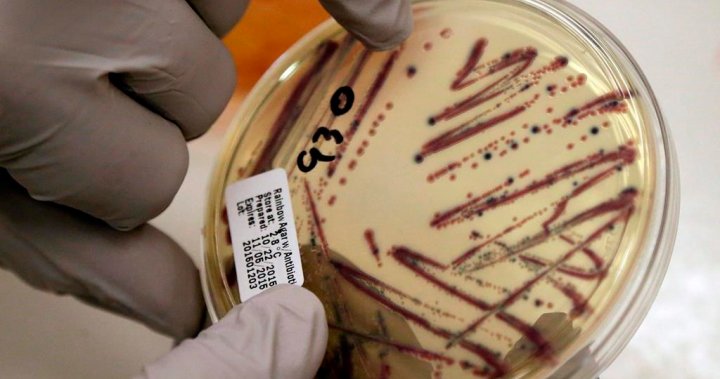While health inspectors and laboratories investigate what is one of the worst food-related E. coli outbreaks in Canada, one food supply expert suspects the issue is likely to have come from further up the supply chain.
On Sept. 4, Alberta Health Services declared an outbreak of Shiga toxin-producing E. coli bacteria, closing 11 daycares in the Calgary area.
On Tuesday, Chief Medical Officer of Health Dr. Mark Joffe confirmed earlier messaging that the epidemiology of the case points to a central kitchen that served the daycares.
“The kitchen was closed and an investigation began immediately,” Joffe said, noting inspectors collected food samples from the kitchen and leftovers from the daycares the next day.
Those samples are under analysis at provincial labs as part of the investigation that includes interviews with everyone affected by the outbreak, to find out what they ate.

On Tuesday, 264 lab-confirmed cases were linked to the outbreak, resulting in a total of 37 hospitalizations and 22 cases of hemolytic uremic syndrome (HUS), a severe kidney and blood complication. Canada typically sees 400 cases of E. coli in a year.
Sylvain Charlebois of Dalhousie University’s Agri-Food Analytics Lab, said investigators should be casting a wider net.
“When you look at a facility like that (central kitchen) serving so many people, you have to look up the food chain to see whether or not some issues could have erupted,” he told Global News. “You need to talk to suppliers, understand how they’re managing risks on their end before anything is shipped to the company itself, the kitchen itself.
“We’re talking about E. coli here and E. coli comes from manure. I can only assume that there’s no manure in the kitchen, so it comes from somewhere.”
Charlebois noted that the website of Fueling Minds, the catering kitchen suspected of being the source, said it uses organic and locally-sourced ingredients to supply daycare facilities. He said while organic and local foods aren’t necessarily more dangerous, those labels do not guarantee safer food.

Charlebois added that, countrywide, the number of health inspectors is “very low” and often inspections of facilities like the central kitchen fall to municipal resources.
Alberta’s CMOH noted many restaurants and kitchens are inspected annually.
Stool samples from the daycare children and staff are also being analyzed to genetically sequence the E. coli strain, Joffe said. Those results will be compared to what was found in the food samples for a match.
“To identify the actual source of the E. coli, you would need to isolate the outbreak strain from one of the foods that was served,” said Michael Gaenzle, professor and Canada research chair in the University of Alberta’s department of Agricultural, Life and Environmental Sciences.

Less than 10 cells of Shiga toxin-producing E. coli can make a person sick, Gaenzle said. A typical gram of any given food contains roughly a trillion bacterial cells, making it extremely difficult to confirm the presence of E. coli. On top of that, the food served may have already been thrown out.
“You are looking for the needle in the haystack,” he said.
If there are no good samples from food, Gaenzle said experts will go back to conventional wisdom about E. coli outbreaks.
He said he suspected undercooked beef will be a link investigators focus on. Parents have said their children were served meat loaf in the days before the outbreak was declared.
Gaenzle said investigations can take weeks. He’s spoken to Alberta Health Services staff who say the labs are completely swamped and a definitive answer matching food samples to those infected may never come.

Central kitchen oversight has also come into question. In the 12 months prior to the outbreak, Fueling Minds had six visits from health inspectors revealing a number of similar violations – some critical – with most being resolved the same day.
“When you look at the data coming out of Alberta Health, it seems as though the province has adopted a risk-based approach, which means, again, you’ll visit some facilities more often. And the number of visits that Fueling Minds have had is quite concerning,” Charlebois said.
Dr. Lorian Hardcastle, an associate professor in health and law at the University of Calgary, said lawmakers should consider improving public health regulations following this outbreak, like follow-up for repeat violations.
“I think revisiting (inspections) to determine whether or not the inspections at the time were adequate and whether there should have been more follow up, I think all of that is something that needs to be looked at in the coming weeks,” Hardcastle said.

“Instead of having an inquiry into those causes, more appropriate will be to revisit standards, revisit policies, potentially revisit legislation in order to prevent a similar incident from happening.”
She also noted one theme in recent Alberta governments under former premier Jason Kenney and now under Premier Danielle Smith has been reducing red tape in as many areas as possible, including in health care and child care.
“I think that governments need to be cautious when they’re talking about reducing red tape because regulation is what prevents incidents from happening,” Hardcastle said. “You need to strike that balance between the appropriate level of regulation to prevent incidents like this from happening, but not overregulating to the point that we’re driving up the cost of these services.”
Charlebois said investing in food safety is an oft-underappreciated part of modern public health.
“Often, investing in food safety is not necessarily a sexy thing to do politically and people will take food safety for granted. They rely on facilities to make sure that they do manage risk properly,” he said.
–with files from The Canadian Press

